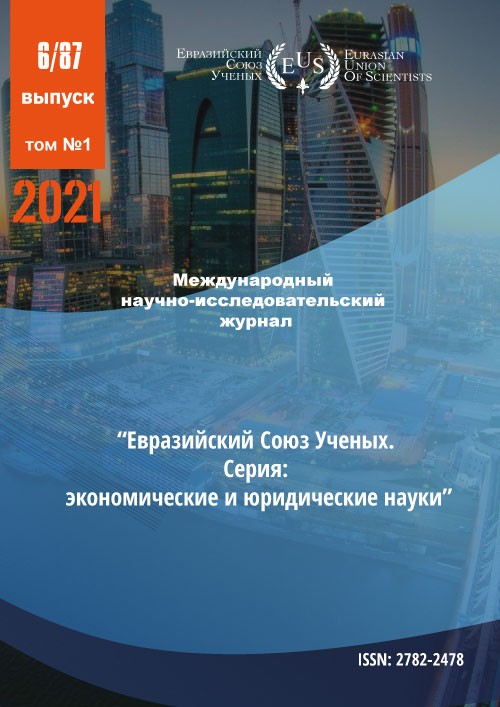ТРУД И КАПИТАЛ: КОНЕЧНЫЙ ПРОДУКТ ОБЩЕСТВА
Аннотация
Показана структура рабочего дня с точки зрения «необходимого и прибавочного продукта и его стоимости», двух подразделений общественного производства, производительного капитала и дохода общества, определены понятия «производительная сила» и «производительность труда». Уточнён «закон прибыли» и «закон эффективности общественного производства». Показан неизвестный до сих пор «закон пропорционального развития общественного производства на примере изменения структуры конечного продукта общества».
Литература
2.Belik A.P. Socialnaya forma dvizheniya. Yavleniya i sushnost. – M.: nauka, 1982.
3.Belova S.V. Fond vozmesheniya sredstv truda i dinamika 1 podrazdeleniya. – M., 1977.
4.Dva podrazdeleniya obshestvennogo proizvodstva, (metodologiya deleniya) / Pod. red. Zalkinda L.I. – M.: Statistika, 1976.
5.Dva podrazdeleniya obshestvennogo proizvodstva / Pod. red. Cherkovca V.N.. – M.: Mysl, 1971.
6.Kulik V., Kulik I. Materialnoe proizvodstvo – osnova socialnoj formy dvizheniya // Vestnik HGAEP. 2001. № 2.
7.Kulik V.I., Kulik I.V. Socialnoekonomicheskaya strategiya garmonichnogo vosproizvodstva i razvitiya nauchnoorganizovannogo, spravedlivogo i suverennogo obshestva / Obrazovanie i nauka: sovremennye trendy kol. mon. / gl. red. O.N. Shirokov.- S. 177215. - Chebaksary: CNS «Interaktiv plyus», 2016. - 215 s.
8.Kulik. V.I. Trud i kapital (Struktura rabochego dnya i dva podrazdeleniya obshestvennogo proizvodstva): Monografiya. Izd-vo Habar. gos. tehn. un-ta, 1997. 9.Kulik V.I. Trud i kapital / V.I. Kulik, I.V. Kulik // Verlag. – Deutsch- land: LAP LAMBERT Academic Publishing, 2013. – 404 c.
10. Kulik V.I, Kulik I.V. Proizvoditelnaya sila i proizvoditelnost truda. Nauka v cifrah – 2017 – № 4 (5) – S. 18-36. (46 s.).
11. Lenin V.I. 1971. Poln. Sobr. Soch. T.4.
12. Lyubimova S. Zakony strukturnoj evolyucii ekonomicheskih sistem // Ekonomist. - 2003. - №10 -S. 29-40.
13. Marks K. Kapital. T.3, ch.1. – M.: Gos. izdvo. lit.,1978.
14. Marks K. Kapital. T.4, ch.1, 2, 3,– (Teorii pribavochnoj stoimosti).– M.: Izd-vo. polit. lit., 1978.
15. Marks K. Kapital. T.1. – M.: Gos. izd-vo. lit., 1949.
16. Marks K. Ekonomicheskie rukopisi 1857-1861 gg., ch. 1, 2, 3. – M.: Izdvo. polit. lit., 1978.
17. Marks K., Engels F. // Soch. 2-e izd. T. 47.
18. Marks K. Kapital. T.2. – M.: Izd-vo. Polit. lit., 1978.
19. Marks K., Engels F. // Soch. 2-e izd. T. 20.
20. Pushkin A.S. Evgenij Onegin; [Boris Godunov; Malenkie tragedii] / Aleksandr Sergeevich Pushkin. – Moskva : Izdatelstvo AST, 2015. – 352 s. – (Eksklyuziv: Russkaya klassika).
21. Shaumyan G.A. Kompleksnaya avtomatizaciya proizvodstvennyh processov. M. : Mashinostroenie, 1973.
22. Shumpeter J. Teoriya ekonomicheskogo razvitiya / Per. c nem. – M.: Progress, 1978.
23. Ekonomicheskij zakon neuklonnogo rosta proizvoditelnosti truda: sushnost, dejstvie i ispolzovanie / Redakcionnaya kollegiya: I.I. Kuzminov i dr., – M.: «Mysl», 1974.
24. Engels F. Karl Marks. – M.: Gospolitizdat, 1955. Statya otpravlena 21.06.2021. (c) V.I. Kulik, I.V. Kulik, 2021.
CC BY-ND
Эта лицензия позволяет свободно распространять произведение, как на коммерческой, так некоммерческой основе, при этом работа должна оставаться неизменной и обязательно должно указываться авторство.







